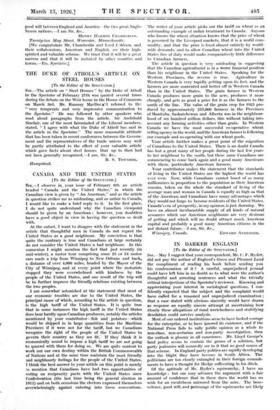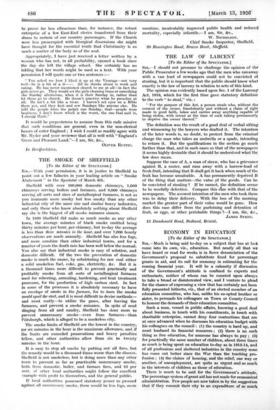IN DARKER ENGLAND
[To the Editor of the SPECTATOR.] Sra,—May I suggest that your correspondent, Mr. C. F. Ryder, did not pay the author of England's Green and Pleasant Land the compliment of reading his book before sending you his condemnation of it ? A careful, unprejudiced perusal could have left him in no doubt as to what were the author's thoughtful and arresting sentences and what the trivially critical interjections of the Spectator's reviewer. Knowing and appreciating your interest in sociological questions, I con- fidently expected that the subject and the complaint would have called for a reasoned and unprejudiced examination ; that a case stated with obvious sincerity would have drawn as response an equally sincere attempt at ascertaining how closely these allegations of rural wretchedness and stultifying desolation could survive analysis.
Most of our ordered institutions seem to have lacked courage for the enterprise, or to have ignored its existence, and if the National Press fails to rally public opinion as a whole to non-class, non-sectarian and non-party investigation, then the outlook is gloomy in all conscience. Mr. Lloyd George's land policy seems to contain the germs of a solution, but party jealousies will assuredly see to it that no good comes of that scheme. In England party polities are rapidly developing into the blight they have become in South Africa. The politicians are too closely entangled in their foreign commit- ments to have a thought for Hodge suffocating in his ditch.
Of the aptitude of Mr. Ryder's squirearchy, I have no knowledge ; but one may advance the argument with a fair amount of confidence that in these days the world has no wish for an escutcheon mirrored from the mire. The bene- volence, good will, and patronage of the squirearchy are likely to prove far less efficacious than, for instance, the robust enterprise of a few East-End clerics transferred from their slums to certain of our country parsonages. If the Church were less preoccupied with liturgical dissensions she might have thought for the essential truth that Christianity is as much a matter of the body as of the soul.
Appropriately, I have just received a letter -written by a woman who has not, in all probability, opened a book since the day she left the village school. She certainly has no
inkling that her words might be used as a text. With your permission I will quote one or two sentences :—
" You asked me how I liked it up at the Vicarage—not very well—ho is a bit of a d—. All he thinks about is work and eating. He has never mentioned church to me at all—in fact the girls never go. They would set the girls cleaning brass or something else Sunday afternoons, when it is their Sunday in, rather than let them go to church. He doesn't practice what he preaches at all He isn't a bit like a vicar. I haven't set eyes on a Bible there yet, and they knit and sew Sundays like anyone else. He told the people from the pulpit one Sunday, that—people were heathens, I don't know which is the worst, the one that said it, I should think."
It would be preposterous to assume from this rude missive that such conditions are general, even in the non-clerical homes of outer England ; I wish I could as readily agree with Mr. Ryder and your reviewer that all is well with "England's Green and Pleasant Land."—I am, Sir, &c., OLIVER RUSTIC.
In Hertfordshire.































































 Previous page
Previous page